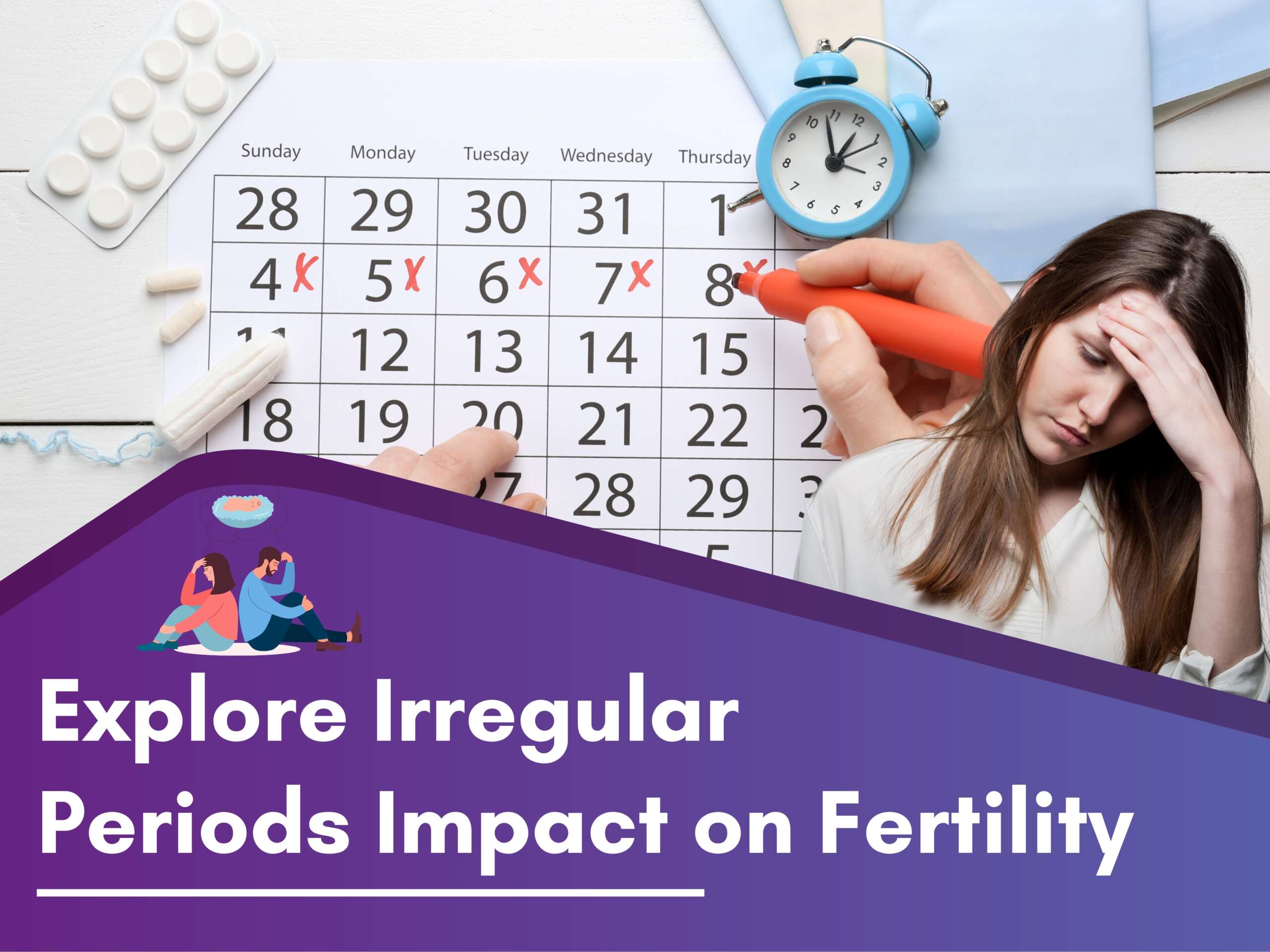
Explore Irregular Periods Impact on Fertility: Insights from Sarthak Fertility and IVF Center in Hisar
Many women worry when their periods become irregular and wonder if it affects their chances of having a baby. At Sarthak Fertility and IVF Center in Hisar, known for their top-notch fertility care, they understand how irregular periods can be connected to fertility issues.

What Are Irregular Periods?
Menstrual Cycles: Our menstrual cycle, often referred to as a woman's "period," is a natural process governed by hormonal changes in the body. On average, it spans between 21 to 35 days, with bleeding lasting about 2 to 7 days. This cyclical process involves the shedding of the uterine lining, commonly known as menstruation, and prepares the body for potential pregnancy each month.
Understanding Irregularities: While this cycle is typically consistent for many women, factors such as hormonal imbalances, stress, lifestyle changes, and underlying health conditions can disrupt this rhythm. Irregularities can manifest as variations in cycle length, skipping periods, or experiencing unpredictable bleeding patterns. These irregularities might raise concerns, especially for those aiming to conceive.
Role of Sarthak IVF Center in Hisar: Sarthak IVF Center in Hisar plays a pivotal role in elucidating the complexities of irregular menstrual cycles, particularly concerning their relationship with fertility. They specialize in providing comprehensive guidance and diagnostic support for individuals experiencing irregular periods and seeking to understand their implications on fertility.
The Relationship Between Irregular Periods and Fertility
The relationship between irregular periods and fertility is complex but interconnected. Irregular menstrual cycles can pose challenges for conception, but they don't necessarily equate to infertility. Here's how they're related
Ovulation Prediction: Irregular periods can make it difficult to predict ovulation accurately. Ovulation, the release of an egg from the ovary, is crucial for conception. Inconsistent cycles mean it's harder to pinpoint the most fertile window, reducing the chances of conception.
Underlying Conditions: Irregular periods might signal underlying health issues that affect fertility. Conditions like Polycystic Ovary Syndrome (PCOS), thyroid disorders, hormonal imbalances, or reproductive system irregularities can cause irregular cycles and impact fertility.
Reduced Frequency of Ovulation: Irregular periods often mean less frequent ovulation. Since ovulation is essential for conception, irregular cycles can reduce the number of opportunities for successful conception within a given timeframe.
Impact on Timing: The irregularity of periods affects the timing and length of the menstrual cycle. This variation can create challenges for those trying to conceive as it's harder to anticipate the ideal time for intercourse for conception.
Emotional Impact: Dealing with irregular cycles can be emotionally taxing for individuals trying to conceive. The uncertainty and frustration associated with irregular periods might contribute to stress, which can further affect fertility.
Seeking Solutions: Fortunately, identifying the underlying cause of irregular periods can often lead to solutions that improve fertility. Treatments tailored to address hormonal imbalances, lifestyle modifications, or medical interventions can help regulate cycles and enhance the chances of conception.
Connecting Irregular Periods impact on Fertility and Having a Baby:
Irregular periods pose a challenge when it comes to conceiving, but they aren't a definitive roadblock to starting a family. At Sarthak IVF Center in Hisar, they've witnessed firsthand how these irregularities can indeed affect the journey towards pregnancy. Understanding the significance of irregular menstrual cycles, the center takes these concerns seriously and actively works to identify tailored solutions for each individual.

The impact of irregular periods on fertility primarily lies in the unpredictability they introduce into the conception process. With irregular cycles, it becomes harder to pinpoint the most fertile days for conception due to inconsistent ovulation patterns. As a result, the window of opportunity for successful conception each month becomes narrower.
Recognizing the complexity of these issues, Sarthak IVF Center approaches irregular periods with a thorough investigation into their underlying causes. Through comprehensive evaluations, including detailed hormonal assessments and in-depth health histories, they aim to uncover the specific reasons behind irregular cycles for each person they assist.
Once the root causes are identified, the center devises personalized treatment plans tailored to regulate and normalize menstrual cycles. These plans focus on addressing the specific issues contributing to irregular periods, with the ultimate goal of optimizing conditions for successful conception.
Reasons Behind Irregular Periods:
Sarthak IVF Center in Hisar has found various reasons why periods might become irregular:
- Hormonal Changes: When our hormones change, it can mess with our periods and make it harder to get pregnant.
- PCOS/ PCOD: A common hormonal problem, PCOS/ PCOD can make periods irregular and affect our chances of having a baby.
- Thyroid Issues: Problems with our thyroid gland can also mess with periods and make it tough to get pregnant.
Stress and Lifestyle: High stress or big changes in our lifestyle, like too much exercise or sudden weight changes, can mess with periods and make it harder to have a baby.
Treatment Options & Approaches at Sarthak IVF Center in Hisar
Sarthak IVF Center Assists with Irregular Periods by Detailing strategies, lifestyle modifications, and advanced fertility treatments to regulate cycles and enhance fertility prospects. This center's Customized approach and innovative techniques provide hope for individuals facing challenges due to irregular periods.
Lifestyle Modifications for Improving Menstrual Regularity
Nutrition, Exercise, and Stress Management
Insights on how lifestyle changes can positively influence menstrual regularity. Sarthak IVF Center advocates for holistic approaches that encompass nutrition, exercise, stress reduction techniques, and their profound impact on fertility and menstrual health.
Conclusion
Understanding irregular periods' implications on fertility is pivotal for proactive management. Sarthak IVF Center in Hisar stands as a beacon of comprehensive support, offering precise diagnosis, personalized treatments, and unwavering guidance to address irregularities and pave the way to parenthood. To know more about Irregular Periods impact on Fertility Click here.
Q1: Are irregular periods a sign of infertility?
Irregular periods don’t always mean infertility. They might make getting pregnant a bit challenging, but they aren’t a definite sign of infertility.
Q2: Can irregular periods be fixed to improve fertility?
Yes, in many cases. Treatments like hormonal therapy, lifestyle changes, and managing underlying health issues can often help regulate periods and improve fertility.
Q3: How do irregular periods affect getting pregnant?
Irregular periods can make it harder to predict ovulation, reducing the window for conception. But with proper monitoring and guidance, pregnancy is still possible.
Q4: When should I seek help if I have irregular periods and want to get pregnant?
It’s a good idea to consult a doctor if your periods are irregular and you’ve been trying to conceive for a year (if you’re under 35) or six months (if you’re over 35).
Q5: Can stress affect menstrual cycles and fertility?
Yes, high stress levels can disrupt hormones and affect menstrual regularity, which can impact fertility. Managing stress might help improve both.
